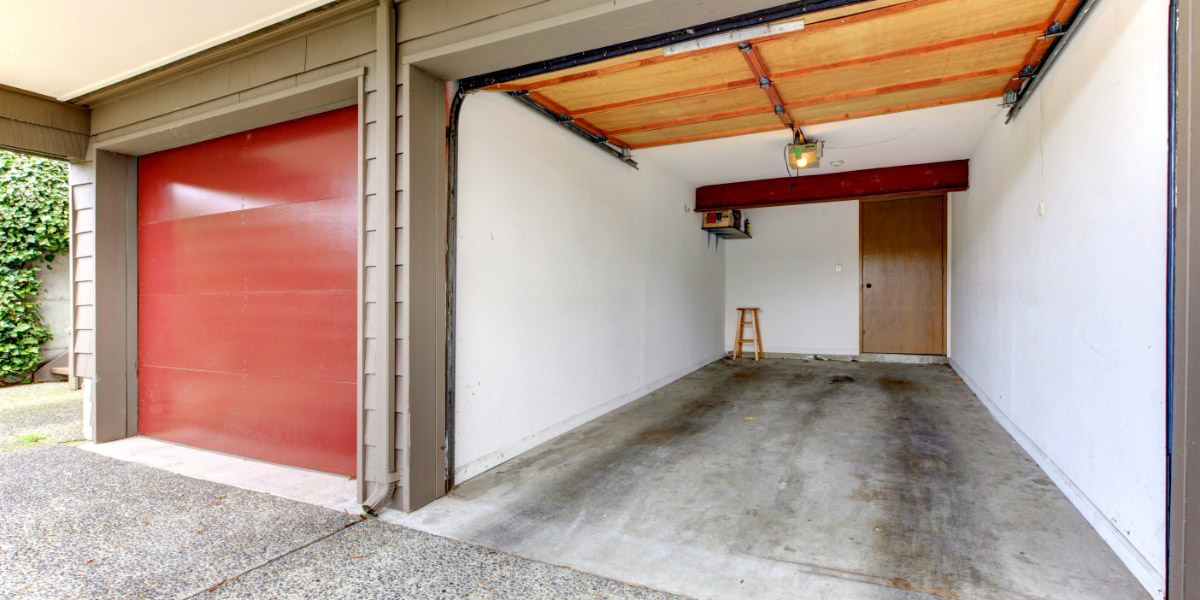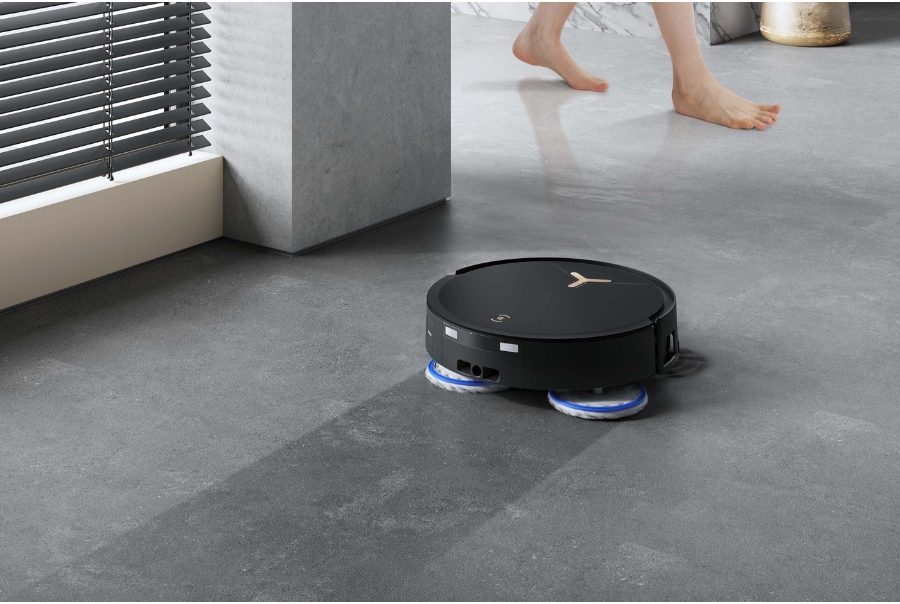How To Choose a Robot Vacuum for Garage Floors?
2025-05-15

Garages are often the forgotten space of household cleaning, acting as a messy, in-between area where dirt, cobwebs, and outdoor debris pile up. With many UK households owning at least one vehicle, and over half having two or more, it’s important to keep garages clean and hygienic.
Struggling to find time for cleaning? Thanks to the latest smart technology, robot vacuums can now help keep your home tidy effortlessly – a godsend for busy UK households.
Do Robot Vacuums Work For Garages?
Yes, robotic vacuums can be used to clean garage floors, which are typically paved with concrete or other hard materials like rubber, PVC, vinyl, or tile floors. Garage owners often face challenges like accumulated dirt, oil stains, and clutter from tools and equipment.
Poor ventilation in garages causes dust and debris, such as sand, gravel, sawdust, or oil stains, to build up quickly. On top of that, the cluttered layout makes it harder and more complicated to clean. Stones or large metal pieces can even void product warranties if accidentally sucked up.
Compared to traditional vacuums, robot vacuums with mapping enjoy the upper hand in terms of hands-free operation, smart obstacle navigation, and the ability to simultaneously vacuum and mop, among other features. For safety reasons, sweep large debris first before vacuuming, and keep in mind that smart vacuums are designed for indoor use and are not recommended for outdoor cleaning.
Best DEEBOT Robot Vacuums For Garages
DEEBOT X8 PRO OMNI

The flagship model DEEBOT X8 PRO OMNI is a powerful robot vacuum and mop for garage cleaning. It features 18,000 Pa suction1 and OZMO ROLLER Instant Self-Washing Mopping Technology, which constantly refreshes the mop with 16 nozzles of fresh water throughout the entire session.
To navigate around obstacles, its AIVI 3D 3.0 Omni-Approach Technology features the embedded LiDAR module, which supports detailed mapping even in low spaces like under shelves or workbenches, while precisely detect obstacles in the path in real-time. The best part? This technology allow the machine to stay close to the edge of objects rather than staying away from them.
DEEBOT X5 PRO OMNI

DEEBOT X5 PRO OMNI is an advanced robotic cleaning solution designed to deliver unparalleled cleaning precision and efficiency. With the revolutionary AINA 2.0 intelligent navigation model, it provides real-time navigation and obstacle avoidance, ensuring seamless movement and precise cleaning.
For uneven floors, it can conquer thresholds and obstacles up to 22mm high2, so you don’t have to worry about it getting stuck. Shop DEEBOT X5 PRO OMNI Now
Key Features in a Garage Robot Vacuum
A good robot vacuum for garages should have strong suction power for lifting heavier dirt, a large dustbin to store large debris, rugged wheels to handle rougher surfaces, and smart navigation to move between obstacles. Besides, some garages without window tend to be a bit darker, in this case, you need an auto vacuum with advanced sensors that works in dim conditions.
Strong Suction Power
A robotic vacuum needs powerful suction to lift heavier dirt, coarse sand, sawdust, fine debris and even small pebbles commonly tracked into garages. When combined with efficient airflow, strong suction removes deeply embedded particles from rough concrete or textured floors. Without it, dirt may get left behind or simply pushed around, eventually requiring extra passes for a thorough clean.
Models with adjustable suction levels let you boost power when needed for tougher messes.
Large Dustbin Capacity
Garages generate a surprising amount of mess, whether it’s dust, fallen leaves, wood shavings, or grit. A smart vacuum with a large dustbin provides more room for debris, allowing it to operate for longer periods without frequent emptying, which is especially useful when cleaning larger garage spaces.
Alternatively, many models can return to their docking station for self-emptying and charging, then resume cleaning where they left off, saving you time and effort.
Rubber or Durable Brushes
Many garages have rough surfaces like textured concrete or epoxy floors. To handle these properly, robot vacuums should come equipped with rubber or other durable brushes. These materials are more resistant to wear and tear and can better handle abrasive debris without damage.
Durable brushes also help capture a wide range of debris from fine dust to larger chunks.
Advanced Obstacle Avoidance
It is very common to double garages as storage spaces for bikes, tools, boxes, and car tireres, thus smart mapping and obstacle avoidance are essential in a robot vacuum to navigate through clutters. Advanced systems use multiple sensors and cameras, such as AIVI 3D 3.0 Omni-Approach Technology, to detect obstacles in real time. In this case, the vacuum can navigate smoothly without constantly bumping into objects or getting stuck under low-clearance furniture.Sensors That Handle Dark or Uneven Floors
Not every garage has windows to let in natural light, thus they are typically darker than other rooms. Plus, dark concrete, oil stains, shadows, or uneven floor textures can confuse basic sensors, causing them to mistake dark surfaces for drop-offs and skip over areas.
Instead, premium models come equipped with LiDAR systems and upgraded sensors that use lasers to map surroundings, allowing them to navigate smoothly even in low-light or irregular environments.
Durable, Rugged Wheels
A key feature for any garage robot vacuum is tough, rugged wheels that can handle cracks, thresholds, rough patches and uneven terrain. Standard models may struggle on such surfaces, but upgraded models are equipped with wheels designed to grip and roll smoothly over bumpy or textured areas, ensuring full coverage and uninterrupted cleaning performance.
How Can Cleaning Robots Work Best in Your Garage?
To get the most out of your robot vacuum when cleaning garages, why not take an extra step? Start by removing sharp or hazardous objects from the floor, preset cleaning schedules for when you’re away, and set no-go zones to block off risky areas. Other good practices include placing the docking station nearby for easy access and regularly deep cleaning the machine to keep it running at peak performance.- Remove damaging obstacles: Sweep up large debris like stones or metal screws, and avoid wet or oily spots that can damage the vacuum.
- Set up virtual boundaries: Use the app to create no-go zones, protecting sensitive areas or delicate tools.
- Pre-schedule cleaning: Programme the vacuum to clean regularly, keeping dust and debris under control even when you’re not watching.
- Position a docking station in the garage: This lets the robot recharge without needing to be moved manually between floors.
- Secure loose objects and cables: Wrap up cords and move small obstacles away from walls to help the vacuum clean faster and more efficiently.
- Maintain the robot vacuum: Regularly wipe sensors, clean brushes, and empty the dustbin for maintenance purpose. Be aware that brushes and filters may wear out faster after cleaning garages.
FAQ
Do robot vacuums clean the dirt and grease left behind by car tireres?
Dual robot vacuum and mops can clean the dirt and grease tracked in by car tireres. In particular, newer models of DEEBOT smart vacuums are equipped with a maximum suction power of 6,000Pa and automatic hot water washing and hot air drying of the mopping pads, to break up and flush away grease.
How can I prevent my robot vacuum from getting stuck in the garage?
Garage floors are usually made of wear-resistant materials such as concrete or tile to withstand the weight of vehicles and the wear and tear of tracked-in materials like gravel. Prevent your robotic vacuum cleaner for garage floors from getting stuck on the floor or under obstacles by putting up virtual boundaries around areas with objects the robot vacuum could snag on. With DEEBOTs, users can also indicate the location of potentially troublesome obstacles to the robot on the smartphone app.
What happens to oil in a vacuum cleaner?
Oily substances that enter robot vacuum cleaners may clog the device's filters, resulting in reduced suction and airflow. It can also coat internal components, potentially damaging the motor or other parts. Additionally, oil in the vacuum bag or dustbin may cause unpleasant odours and can be difficult to clean, which can impact the vacuum’s overall performance.
Will a robot vacuum pick up dust and debris on cement floors?
Yes, a robot vacuum can effectively pick up dust and debris on cement floors. These gadgets are equipped with strong suction power and brushes designed to capture dirt, dust, and small debris from rough surfaces like cement. Their sensors allow them to navigate uneven textures, making them suitable for cleaning garages, basements, and similar cement-floored areas.
Disclaimer(s):
- 18,000Pa: This data comes from ECOVACS laboratory. The suction power of DEEBOT X8 PRO OMNI can reach 18,000Pa.
- 22mm high: This data comes from ECOVACS laboratory.
Related Products







